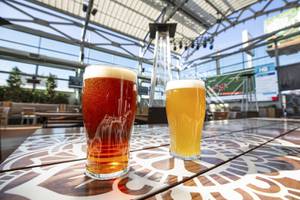Before the plant-based cheese tasting, before we learned about the wonders of the Canadian yellow pea, before Kogi BBQ food-truck founder Roy Choi showed us the signature burger from his forthcoming fast-food joint, the first ever Bite Silicon Valley food and technology conference started with a discussion about quinoa.
Quinoa, said one of the panelists inside Levi’s Stadium in Santa Clara, California, last week, was a healthy food success story, a good-for-you crop that has infiltrated America and exploded in popularity. With a higher profile and prices to match, the gluten-free grain has become a regular sight in the carts of Whole Foods shoppers, and has even brought some wealth back to the impoverished region of Bolivia where it’s primarily grown. As far as grains go, this one seemed almost heroic.
A few minutes later, however, chef chair and keynote speaker José Andrés hopped to the mic for an unplanned comment. The quinoa mania hadn’t just raised prices, he said. It had also lifted the South American crop beyond the reach of many of the farmers who grow it. (And that’s just a sliver of the saga playing out in Bolivia.) The quinoa boom, well, it wasn’t all benevolent.
Much of the conference invoked that same duality as it grappled with food through the lenses of environment, nutrition, obesity, waste and the really big question: How will we feed 9 billion people in 2050?
Of course, there's no single answer, no silver bullet to ending hunger, obesity and environmental degradation. But at Bite SV there were big ideas and bold discussions. The head of Google’s global Food Program talked about nudging his workforce toward a more plant-focused diet. Another presenter spoke about recovering and redistributing leftover food from dining halls on college campuses. One panel asked us to embrace oddly shaped carrots, stumpy spinach and other “imperfect produce” to cut back on the massive amount of edible fruit and vegetables that gets thrown away on the average farm.
Josh Tetrick, CEO and founder of Hampton Creek, showed us how research into plant species we don’t usually consume could yield astonishing innovations, like the varietal of Canadian yellow pea that emulsifies at the right temperature, eliminating the need for eggs in his company’s Just Mayo. Dr. Robert Fraley, executive vice president and chief technology officer at Monsanto, discussed the importance of getting more food out of every swath of farmland.
It was enlightening and encouraging, less because anyone presented a clear and concise answer than because no one even pretended that they could.
“We need to be pragmatic,” Andrés told me when I asked how all this talk of sustainability applied to our crazy mirage in the middle of the desert. He suggested Las Vegas might learn a thing or two from agricultural experiments in Israel and elsewhere in the Middle East, that perhaps our environmental challenges could breed creative technologies. “We all take a shower and the water goes somewhere. There is a very smart group of people out there who are coming up with [solutions]; sometimes we are not implementing those solutions. Vegas could be a very good ground to implement some of those solutions.”
The romantic idea of eating locally, of sourcing all your food from within a 100-mile radius, is shortsighted, Andrés said, both in the desert and out of it. “If that fish [Paul Bartolotta is] bringing in is creating employment in Greece—which right now they are in an economic downturn—and he is supporting the lives of thousands of local fisherman, that’s a good thing,” Andrés said. “If we buy avocados from Mexico and we empower the lives of farmers living south of the border … we don’t give them reason to leave their country and cross into America.”
With so many factors to consider, so many pros and cons, so much metaphorical quinoa, the problems can feel unconquerable, even to a force of nature like the Spanish chef behind five Las Vegas restaurants.
“If I had to be in power to make every single decision about how the food system in the world was going to change, with all the knowledge I have and with all the people I have around me that have whatever knowledge I lack, it still would be hard to say,” Andrés said.








